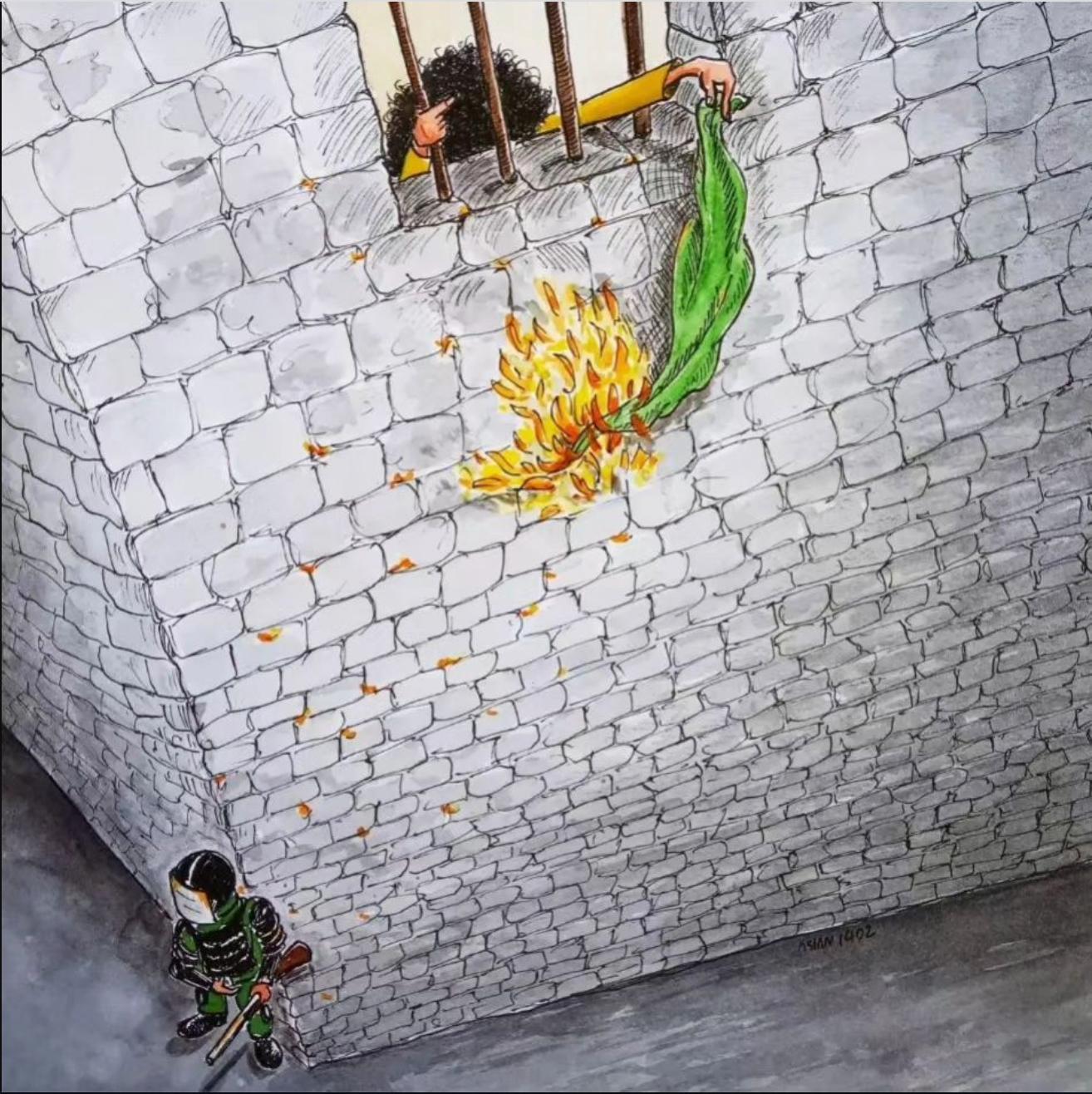Yesterday, Narges Mohammadi was transported from Tehran’s Evin Prison to a hospital—without a hijab which she had refused to submit to wearing, but reportedly with severe blockage in two coronary arteries. Hours later, she was returned to Evin. She was denied critical, urgent medical care for over a week as Iran’s misogynistic mullahs denied her transfer without hijab. In her own words: “The government has put women in a dreadful and inhumane situation: forced hijab or death.” This was on the heels of Narges’ protest statement after teen Armita Geravand’s death at the hands of hijab enforcers.1
As we write, the details of her precarious medical condition are not fully known. The regime’s official press declared that she is in “normal health condition” but admitted that test results on her heart are not yet known. Two days earlier, Narges had declared she had gone on hunger strike, which was widely reported in the international press. Seven of her (unnamed) cell mates in the women’s ward had joined her in this strike. A statement from her family said the point of her strike was to protest “delaying and preventing medical care for sick inmates as well as the mandatory hijab policy for women.”
Narges is the 2023 Nobel Peace Prize laureate for her lifelong activism for human rights, and in particular in solidarity with the “Women, Life, Freedom” uprising. On November 6, the chair of the Nobel Committee sounded the alarm in a statement that “Narges Mohammadi’s initiation of a hunger strike demonstrates the seriousness of the situation” and demanded that Narges and other women prisoners be provided with “whatever medical assistance they may need.” Amnesty International issued an alert three days later saying, “The Iranian authorities are callously toying with the life of arbitrarily detained human rights defender and 2023 Nobel Peace Prize winner Narges Mohammadi by deliberately delaying and denying her adequate healthcare.”
Watch on Instagram this video, taped earlier, where Narges details out how prison uses endless delays of medical care and a host of other pressures to kill prisoners.
Putting It All on the Line for Justice and Principles
Narges has been arrested over a dozen times and is currently serving a 10-year prison term for her implacable resistance to an oppressive regime and for a better world. Her activist husband Taghi Rahmani and her twin teenage children have lived in exile in France for years without her. In April 2022, she was brutally arrested while on medical furlough post heart surgery, and taken to Evin prison for defending others, this time for exposing the torture of women in Qarchak Prison. In 2020, she said, “I have been on the same path since 1992. For me, struggle and resistance are defined as my course in life, and this is the course I have chosen.”
Specifically, Narges has fought fiercely against the compulsory hijab/headscarf in Iran. She wrote in her thank you letter to the Nobel Committee, smuggled out of prison: “I hereby declare that the Islamic Republic imposes compulsory hijab on the society not out of concern for religious obligations, nor for the sake of social customs and traditions, nor as it claims, to preserve the dignity and prestige of women; rather, it openly forces the compulsory hijab on them for the purpose of suppressing and controlling women and for extending that control to the entire society. Thus, it legalizes and institutionalizes discrimination and oppression against women. But Iranian women are conscious of this and therefore, will not tolerate it.”
What’s at Stake
Narges and the many political prisoners in Iran STAND OUT IN OUR WORLD TODAY where too many are being willfully blind to unacceptable and unnecessary suffering inflicted on others by oppressive regimes. Narges is playing a leading role from behind prison walls and needs to be on the streets. She is firmly going against the tide inside and outside Iran in denouncing the genocide in Gaza by Zionist Israel and its Uncle Sam. Think about it—the Islamic Republic says it supports Palestinians, yet it is murderously persecuting Narges, who posted pictures of Palestinian children injured in Israeli airstrikes with the following declaration: “Behind the cold and dark walls of Evin Prison, although I am in chains but with the loudest voice, [am] calling for an immediate ceasefire.” Her statement has been signed by over 160 people of conscience.
As she referred to in the above letter, this current phase of the continuing battle around hijab takes place in the context of the horrendous genocide of the Palestinian people and the intensifying of tensions in the region. This is a conflict behind “two outmodeds” (as described by Bob Avakian2), two historically obsolete forces which reinforce each other—Western (especially U.S.) imperialism and Islamic fundamentalism.
Narges Mohammadi and the courageous political prisoners of Iran, especially in these critical times, serve as models of personal sacrifices for righteous resistance against oppression not only in Iran, but inspire people worldwide. Those who yearn for and are fighting to bring forward a world without oppression, especially of women, religious tyranny, and capitalist exploitation, should take heed. Now more than ever the fight to free Iran’s political prisoners must be urgently taken up by justice-loving people and freedom fighters everywhere.
In her book White Torture (now film, see sidebar) and her other reports on fellow women political prisoners, she has used her voice to call attention to the conditions of many less well-known prisoners. For example, in June 2023, she issued a letter about the denial of medical care for her cellmate Nahid Taghavi.
We urge our readers to attend the screening of this film and discuss afterwards how to volunteer with the IEC and spread the global fight for all our courageous sisters and brothers, political prisoners in Iran like Narges Mohammadi. There is new urgency to what our Emergency Appeal says:
All of Iran's political prisoners must be unconditionally and immediately released. The governments of the U.S. and Iran act from their national interests. And, in this instance, we the people of the U.S. and Iran, along with the people of the world, have OUR shared interests, as part of getting to a better world: to unite to defend the political prisoners of Iran. In the U.S., we have a special responsibility to unite very broadly against this vile repression by the IRI, and to actively oppose any war moves by the U.S. government that would bring even more unbearable suffering to the people of Iran. We demand of the Islamic Republic of Iran: FREE ALL POLITICAL PRISONERS NOW! We say to the U.S. government: NO THREATS OR WAR MOVES AGAINST IRAN, LIFT U.S. SANCTIONS!
Watch White Torture, the Documentary

Flyer prepared by Bay Area college students for film showing
In these fraught times in the Middle East and the world, the voice of Iran’s political prisoners, Narges Mohammadi, and her general stand of relying and calling on the people of the world to fight for justice and a better world, is one which we should all defend and emulate. One way of doing this now is to join the struggle for her immediate and unconditional release. Another important way is to amplify her work, such as her book, White Torture. It is based on interviews with 12 women prisoners about solitary confinement, abuse, and the death penalty. The English version of her book is currently out of stock in the U.S., but available as an audio book on Audible. Also, join us to organize and promote showings of the documentary film White Torture, which is subtitled in English.
Join a special screening initiated by Bay Area college students. Buy tickets and watch trailer at: roxie.com/film/white-torture/ or Eventbrite.
Join us on Sunday, November 12, at the San Francisco Roxie Theater in the Mission District to view this powerful 90-minute documentary. It is the first time the film will be shown publicly in a theater in the U.S. During the brief interim between prison terms, and filming in secret, Narges turned the book into a documentary, subtitled in English. After the film, follow up with an organizing IEC Zoom meeting on Tuesday, November 14 at 6:00 pm. Email the IEC for Zoom link.

